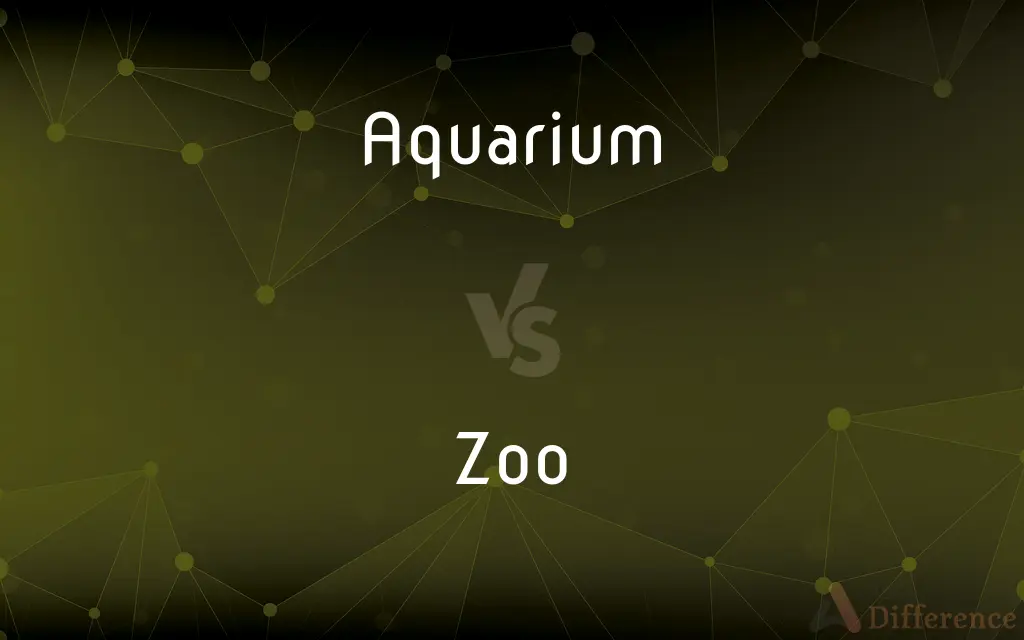Aquarium vs. Zoo — What's the Difference?
By Fiza Rafique & Maham Liaqat — Updated on April 16, 2024
An aquarium specializes in aquatic life, showcasing fish and marine species in water-filled tanks, while a zoo features a variety of terrestrial animals in enclosures designed to mimic their natural habitats.

Difference Between Aquarium and Zoo
Table of Contents
ADVERTISEMENT
Key Differences
An aquarium is dedicated to the exhibition and study of aquatic organisms, including fish, invertebrates, marine mammals, and plants. Whereas, a zoo focuses on a broader range of animals, primarily terrestrial, including mammals, birds, and reptiles.
Aquariums are characterized by their large tanks and controlled aquatic environments, designed specifically for water-dwelling life. On the other hand, zoos contain enclosures that replicate various land-based ecosystems to suit the needs of different animal species.
The main educational goal of an aquarium is to inform visitors about aquatic ecosystems and conservation of water habitats. While, the focus of a zoo is more diverse, aiming to educate the public about animal behavior, conservation, and the diversity of life across multiple habitats.
Aquariums often engage in breeding programs specifically for fish and marine species, contributing to marine biology research. Whereas, zoos participate in global conservation efforts and breeding programs for a variety of endangered species across different animal groups.
Aquariums typically offer displays related to oceanography and marine ecology, making them key venues for marine education. In contrast, zoos provide a broader educational spectrum that includes zoology, environmental science, and even botany, given their diverse array of plant and animal exhibits.
ADVERTISEMENT
Comparison Chart
Focus
Aquatic life
Terrestrial and some aquatic life
Environment
Water-filled tanks
Various land-based enclosures
Educational Goals
Aquatic ecosystems, conservation
Animal behavior, conservation
Species Exhibited
Fish, marine mammals, invertebrates
Mammals, birds, reptiles, some fish
Research and Conservation
Marine biology, fish breeding
Broad animal conservation, breeding
Compare with Definitions
Aquarium
A tank or building where fish and other aquatic animals are kept.
She added a small aquarium to her office for relaxation.
Zoo
An educational resource on biodiversity and conservation.
The zoo collaborates with schools on environmental education projects.
Aquarium
A facility housing aquatic species in artificial conditions.
The city's aquarium showcases a spectacular coral reef display.
Zoo
A place where visitors learn about animal behavior and habitats.
Kids at the zoo enjoy watching the feeding times of animals.
Aquarium
A public attraction featuring underwater environments.
The new jellyfish exhibit at the aquarium is a visitor favorite.
Zoo
A collection of exotic animals in controlled environments.
Our local zoo has added a tropical bird aviary.
Aquarium
A place for the study of aquatic life.
The aquarium conducts research on tropical fish breeding.
Zoo
A facility for the conservation of diverse animal species.
The zoo participates in several international species preservation programs.
Aquarium
An institution for marine conservation education.
The aquarium offers programs about the importance of ocean ecosystems.
Zoo
A park or institution where wild animals are kept for public display.
The zoo's new lion exhibit draws large crowds.
Aquarium
An aquarium (plural: aquariums or aquaria) is a vivarium of any size having at least one transparent side in which aquatic plants or animals are kept and displayed. Fishkeepers use aquaria to keep fish, invertebrates, amphibians, aquatic reptiles, such as turtles, and aquatic plants.
Zoo
A zoo (short for zoological garden; also called an animal park or menagerie) is a facility in which animals are housed within enclosures, cared for, displayed to the public, and in some cases bred for conservation purposes. The term zoological garden refers to zoology, the study of animals.
Aquarium
A tank, bowl, or other water-filled enclosure in which living fish or other aquatic animals and plants are kept.
Zoo
An establishment which maintains a collection of wild animals, typically in a park or gardens, for study, conservation, or display to the public.
Aquarium
A place for the public exhibition of live aquatic animals and plants.
Zoo
A park or an institution in which living animals are kept and usually exhibited to the public. Also called zoological garden.
Aquarium
A tank, often made of glass, for keeping live fish or other aquatic animals.
Zoo
(Slang) A place or situation marked by confusion or disorder
The bus station is a zoo on Fridays.
Aquarium
A public place where live fish and other aquatic animals are exhibited.
Zoo
A park where live animals are exhibited.
Aquarium
An artificial pond, or a globe or tank (usually with glass sides), in which living specimens of aquatic animals or plants are kept.
Zoo
Any place that is wild, crowded, or chaotic.
The shopping center was a zoo the week before Christmas.
Aquarium
A tank or pool or bowl filled with water for keeping live fish and underwater animals
Zoo
A large and varied collection of something.
Zoo
The jungle.
Zoo
(slang) A zoophile.
Zoo
The facility where wild animals are housed for exhibition
Common Curiosities
Can you find marine mammals in both aquariums and zoos?
Yes, marine mammals can be found in both, but are more central to aquariums.
Are aquariums or zoos better for learning about ocean life?
Aquariums are specifically tailored for education about ocean life and marine conservation.
How does a zoo differ from an aquarium?
A zoo features a wider range of both terrestrial and some aquatic animals, while an aquarium specializes in aquatic species.
What kind of research is conducted at aquariums? Research at aquariums often focuses on marine biology and the breeding of aquatic species.
How do the environments differ between a zoo and an aquarium?
Zoos replicate land-based habitats, while aquariums consist of large water tanks.
Why visit an aquarium?
Do zoos contribute to conservation?
Yes, zoos engage in various conservation efforts and breeding programs for endangered species.
Are there interactive experiences available at both zoos and aquariums?
Yes, both offer interactive experiences to enhance learning and engagement.
What is the primary focus of an aquarium?
The primary focus is on aquatic life and ecosystems.
What educational goals do aquariums and zoos share?
Both aim to educate the public about conservation, though their focal ecosystems differ.
What types of animals are typically found in an aquarium?
Mainly fish, marine mammals, and other water-dwelling species.
How do aquariums aid in marine conservation? They conduct specialized research and public education focused on marine ecosystems.
Can aquariums and zoos be found in the same city? Often, large cities may have both an aquarium and a zoo as separate or combined institutions.
To learn specifically about aquatic ecosystems and the organisms that inhabit them.
Why visit a zoo? To gain a broad understanding of various animal species and their conservation.
What is unique about the educational programs at zoos?
Zoos offer a wide range of programs covering zoology, environmental science, and botany.
Share Your Discovery

Previous Comparison
Modernism vs. Traditionalism
Next Comparison
Collegiate vs. CollegeAuthor Spotlight
Written by
Fiza RafiqueFiza Rafique is a skilled content writer at AskDifference.com, where she meticulously refines and enhances written pieces. Drawing from her vast editorial expertise, Fiza ensures clarity, accuracy, and precision in every article. Passionate about language, she continually seeks to elevate the quality of content for readers worldwide.
Co-written by
Maham Liaqat















































